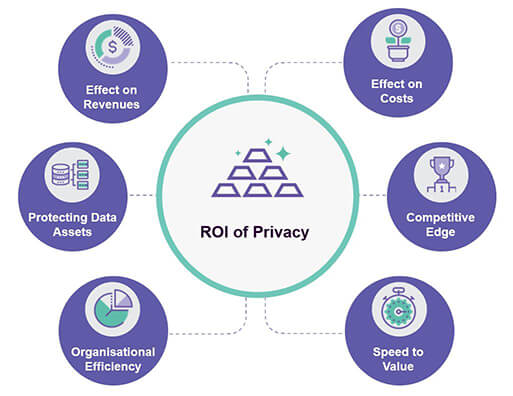
While investments in privacy have traditionally been viewed as the cost of minimizing the threat of data breaches, the conversation has more recently shifted from one of risk and repercussions to one of opportunity and innovation. In correlation with the evolving sophistication of the regulatory landscape, the commercial view – and the consumer view – of privacy has matured to a critical juncture of awareness, advocacy and action that is feeding into the rewiring of a data-led economy.
The accelerated pace of digital transformation and the need to embrace data analytics to drive commercial success has not only rendered privacy a strategic imperative but has led future-thinking organizations to leap-frog ahead of laggards with an understanding of the rewards that derive from implementing an ROI-focused data strategy that harnesses privacy tech to leverage untapped data, automate arduous processes and build consumer trust.
Business benefits beyond compliance
Despite the economic impact of COVID-19, Cisco’s Data Privacy Benchmark Study found that, in 2020 alone, privacy budgets doubled to an average of $2.4 million, with 93% of organizations voicing the significant role that privacy teams played in helping to navigate and respond to the challenges faced. Of significance was the report’s findings on the privacy pay-off that organizations are now benefiting from; these benefits materialize in the form of mitigated losses from data breaches, reduced sales delays, optimized operational efficiencies, increased customer loyalty, strengthened brand value to investors, as well as improved agility and innovation.
In fact, for every dollar spent on privacy, the report found that the average business sees a $2.70 return in benefits, a number that is set to increase since the continual sophistication of data analytics techniques and the complexities of data privacy considerations are intrinsically linked.
From vast data lakes to lucrative revenue streams
By 2023, Gartner predicts that ‘65% of the world’s population will have its personal information covered under modern privacy regulations’ and ‘through 2023, organizations that can instill trust will be able to participate in 50% more ecosystems, expanding revenue-generation opportunities’. In its research, Modeling the Impact of AI on the World Economy, McKinsey noted that data-fueled applications of artificial intelligence are projected to generate $13 trillion in global economic activity by 2030.
As we hurtle towards a future that is fast belonging to those who can lean into a privacy-first mindset while leveraging predictive and autonomous analytics, it’s little surprise that 50% of large organizations are predicted to default to privacy-enhancing computation by 2025 in order to turn their vast data lakes into lucrative revenue streams, while retaining customer trust and loyalty.
Diving into the ROI: driving value, differentiation and digital trust
As the growth trajectory of privacy-enhancing technologies continues to soar, how can organizations look to calculate and, quite often, justify the investment in privacy programs to drive their big data and business insights engine? Explore Trūata’s ROI of Privacy Framework:

Protect data assets and cut down costs
By leveraging ready-built software and solutions that can identify and mitigate data privacy risks, organizations can save not only on the impact of financial losses that affect operations in the short term, but they can also avoid reputational damage for years to come. According to IBM’s Cost of a Data Breach Report, the average time to identify and contain a data breach is 280 days and the average global cost is $3.86 million, a figure that rises to an average of $8.64 million in the US and costs the global healthcare industry an average of $7.13million. Worth noting also is the impact on stock market performance, with breached companies averaging a share price drop of 15.6% after three years.
And the costs don’t just stem from failures to comply with regulations. According to the Global Consumer State of Mind Report 2021, privacy has fast become a key business differentiator. Consumers are more likely to spend their money and be loyal to brands that take a proactive approach to protecting their privacy; therefore, failure to protect privacy directly impacts profit. In fact, 79% of global consumers agree that data privacy is now essential to them, with 69% being more likely to be loyal to a brand that acts responsibly with their data. In cases where customer privacy concerns are raised, the average sales delay ranges from 3.6 weeks to 5.5 weeks, impacting costs.
Automate data governance with confidence
As organizations look to hyperautomation to streamline and scale enterprise strategies, privacy-enhancing technologies hold the key to agile and robust data governance that enable an organization’s data to flow efficiently and compliantly both internally and when conducting international data transfers. Not only this, but such technologies can safeguard data to the highest global regulatory standards while simultaneously creating an auditable trail of compliance that can be accessed at speed.
Research documented in the Future of Finance Report found that the financial sector in particular struggled with the dependence on manual regulatory reporting processes and overcoming inefficiencies surrounding data processing, highlighting that the industry cost of regulatory reporting for UK banks alone is in the region of £2billion to £4.5billion per year. And with access to data across industries often being held up by weeks or months due to issues surrounding data governance, it seems logical to look towards automated, standardized solutions that are efficient, risk-averse and cost-effective.
Not only are organizations overcoming issues with speed-to-value insights, but workforce transformation has further complicated data governance and security workflows. Blended environments are causing organizations new levels of complexity as they now try to account for compliance frameworks that vary based on where data users are sitting, what information they require access to and what sector they work in. As such, it will be those who assess the strategic and long-term investment of privacy-enhancing technologies, capabilities and infrastructure that will be empowered to nimbly shift to meet the rising demands of a fast-moving digital economy.
Accelerate revenue growth and innovation
While data privacy strategies have often felt restrictive to business growth, privacy-enhancing technologies have evolved to such levels of sophistication that they now hold the key to unlocking untapped data and new revenue streams. By harnessing the power of privacy-enhancing technologies to pseudonymize or anonymize data, organizations can protect company value, existing revenue streams and customer loyalty while at the same time opening the doors to new opportunities to gain a competitive advantage.
Real-time insights, the ability to conduct longitudinal data analyses and to leverage predictive modeling are key to driving growth and innovating at speed in a data-driven world; however, regulations raise a number of complexities for data controllers; these include obstacles surrounding data retention, the right to be forgotten, and complexities pertaining to consent. Privacy-enhancing technologies not only help to overcome these obstacles but enable organization’s to tap into data that would otherwise be off limits and do more with that data to drive innovation. For example, anonymization can open the door to deeper insights through combined analytics, leading to a wider view of behaviors and increasing the opportunities to deliver innovative products and services based on richer insights.
Prioritizing privacy investments
When it comes to prioritizing privacy investments that will render returns, make sure to look towards privacy programs that can help you to develop robust organizational governance and accountability that can be demonstrated to employees, customers and key stakeholders. Look beyond legal compliance and work towards increasing transparency around your data processing activities. Make sure you invest in those who have the right privacy and technical expertise, can deliver a standardized approach to data management and reassure you with confidence through external privacy certifications, which are fast becoming critical factors in the buying process.
Dive deeper into our on-demand webinar to unlock our ROI of Privacy Framework which provides illustrative impact analyses, case studies and commentary from our Chief Data Scientist, Dr. Maurice Coyle. Alternatively, contact us directly to find out how our frictionless technologies can assist you in overcoming your big data challenges.